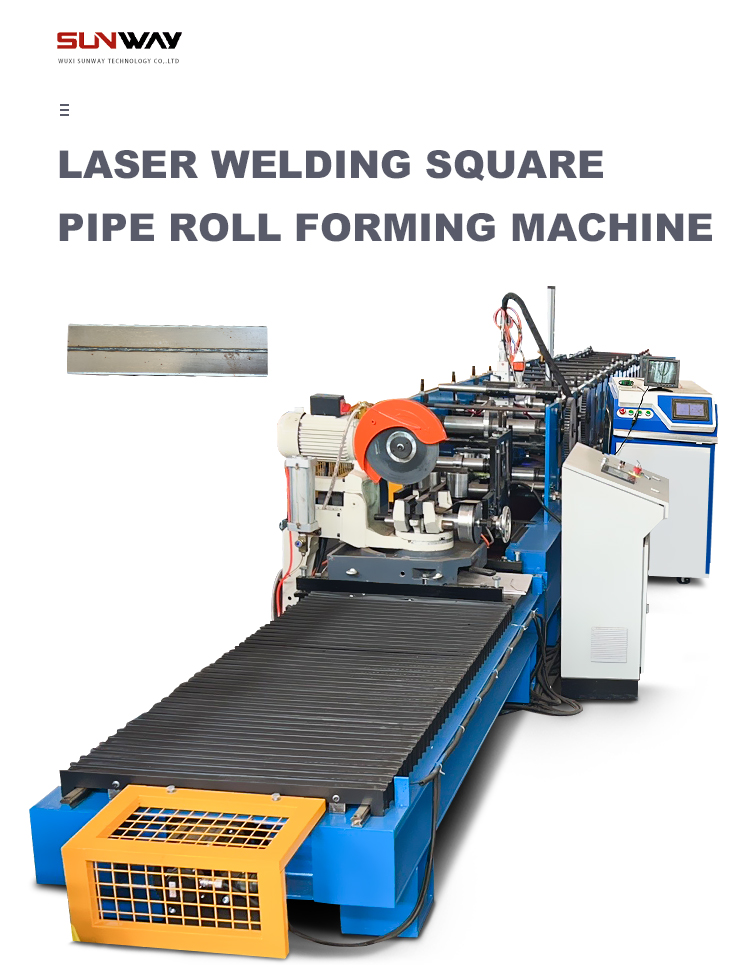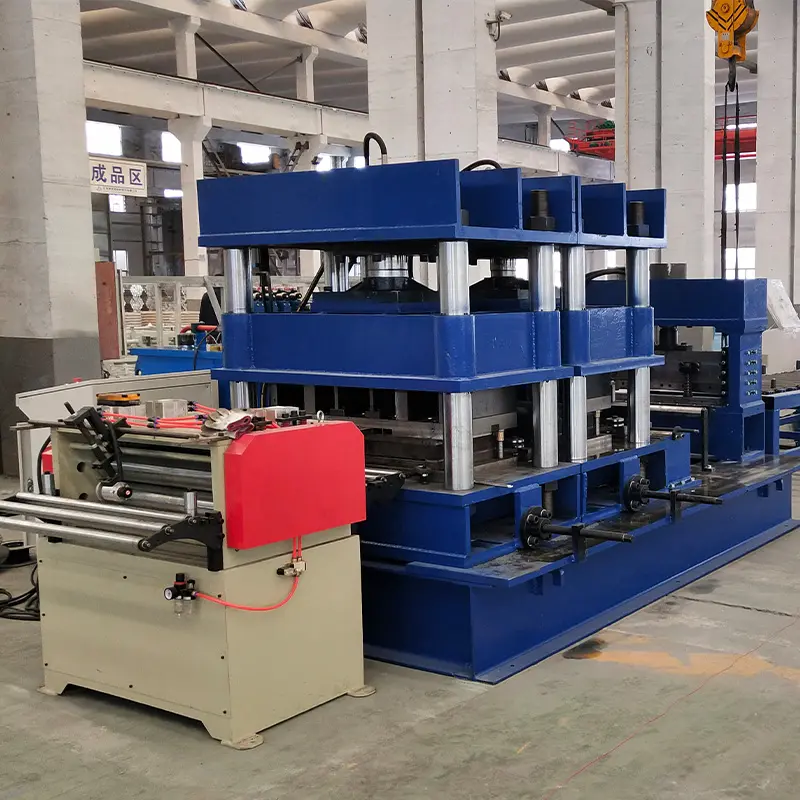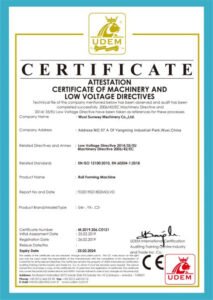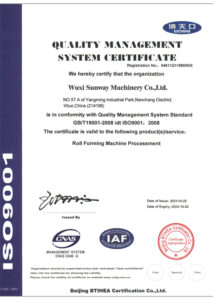- HOME
-
PRODUCTS
- Electric & Energy
- Racking & Shelving
- Steel Structure
-
Metal Wall & Roofing
- Corrugated Roof Panel Roll Forming Machine
- Trapezoidal Roof Panel Roll Forming Machine
- Roof Tile Panel Roll Forming Machine
- Double Layer Panel Roll Forming Machine
- Ridge Cap Roll Forming Machine
- Gutter Roll Forming Machine
- Downspout Pipe Roll Forming Machine
- Bemo Roof Panel Roll Forming Machine
- Barrel Corrugated Roll Forming Machine
- Highway Engineering & Vehicle
- Door & Windows
- ABOUT US
- FAQ
- NEWS
- MORE MACHINES
- CONTACT US
Steel Silo Forming Machines
Steel Silo Forming Machines
Feb 06, 2024
Steel silo forming machines are used to manufacture silos, hoppers, ducts, and other industrial storage vessels from steel coil material. This automated equipment forms the steel coil into the desired cylindrical or conical shape using a series of rollers while welding along the length to create large seamless tanks.
Steel silos provide excellent storage for bulk solids like grains, cement, minerals, etc. They are weather and corrosion resistant, easy to install, and require minimal maintenance. Steel forming machinery allows mass production of storage silos tailored to customer specifications.
Steel Silo Forming Machine Types
| Machine Type | Description |
|---|---|
| Roll Forming | Coil steel fed through series of roller dies to gradually shape into cylinder |
| Press Brake Forming | Flat steel sheet pressed into shape between male and female ridges |
| Spinning Lathe | Steel plate spun against rollers to form concave/convex shells |

Working Process
The working process of a steel silo forming machine starts by loading a coil of thin steel sheet onto a de-coiler mechanism. The sheet is gradually fed through a series of roller dies engraves with the desired profile. As the sheet passes each roller station, it is bent into the cylindrical or conical form through a cold roll forming process without applying heat.
The edges of the formed sheet are then welded together along the length of the silo as it progresses through the machine. This creates a seamless, leakproof storage tank tailored to the exact size and capacity requirements. Modern steel silo machinery is fully automated with precision roller feeds and computerized controls to fabricate silos of various dimensions.
Operators can customize parameters like height, diameter, wall thickness, slope, number and size of outlets, surface finish, etc. The machine handles activities like de-coiling, feeding, pre-punching holes, forming, welding, cutting and deburring to output a ready-to-install steel silo in hours. Special features like corrugation, fins, ladder supports or surface coatings can also be integrated.
Material Feeding
- •Coiled sheet steel loaded onto powered de-coiler and straightened automatically
- •Roller feed pulls sheet through series of bending dies
- •Feed speed synchronized with welding speed
- •Various steel grades like stainless, galvanized, carbon steel used
- •Sheet thickness from 0.5mm to 2mm for tanks up to 6m diameter
Profile Forming
- •Cold roll forming process used without applying heat
- •Sheet steel bent gradually by contour profiled roller dies
- •Rollers engraves to required radius/angle of silo sides
- •Forming stations setup to achieve steady curvature
- •Conical sections created by precise roller positioning
Welding
- •Formed steel sheet welded along length to create leakproof seam
- •MIG, TIG, Spot, laser welding options for various materials
- •Automatic oscillating or rotary welding torches used
- •Continuous, high-speed welding upwards of 10m/min
- •Welding done from inside and outside for smooth finish
Cutting and Deburring
- •Formed, welded silo cut to desired height on exit
- •Automatic oxy-fuel torches used for cutting
- •Laser, plasma cutting available for neat edge
- •Special deburring rolls or brushes used
- •Smooth edge and weld seam ensures easy installation
Design and Customization
- •Various loading/unloading outlets and covers designed
- •Ladders, fins, platforms, etc integrated on sides
- •Corrugations, stiffeners added for structural strength
- •Surface coatings like epoxy, zinc applied
- •Logos, graphics printed using inkjet technology
- Highway Guardrail End Terminal Forming Machine
- Highway U/C Post Roll Forming Machine
- 2 Waves Highway Guardrail Roll Forming Machine
- 3 Waves Highway Guardrail Roll Forming Machine
- Vineyard Post Roll Forming Machine
- Auto Size Changeable Sigma Purlin Roll Forming Machine
- Auto Size Changeable C Z Purlin Roll Forming Machine
- Auto Size Changeable Z Purlin Roll Forming Machine
- Auto Size Changeable C U Purlin Roll Forming Machine
Steel Silo Forming Machine Manufacturers
| Company | Location | Type |
|---|---|---|
| Spiroflow | USA | Roll Forming |
| Jorgensen Conveyors | USA | Roll Forming |
| Gough Econ | UK | Spinning Lathe |
| Sesotec | India | Roll Forming |
Price Range
- •Small Roll Forming Machine – $50,000 to $250,000
- •Large Automated Line – $500,000 to $5 million
Factors affecting price:
- •Forming length and speed
- •Level of automation
- •Material thickness capacity
- •Customization features
- •Production output requirement
- •Additional peripheral equipment
Installation Requirements
| Parameter | Details |
|---|---|
| Location | Indoor factory site, stable flat floor |
| Power | 25 to 50kW connection, 480V 3-phase |
| Compressed Air | 10 bar pressure for automation |
| Material Handling | Lifting equipment to load coil stock |
| Commissioning | 1 week by technician |
Operation
- •Mostly automated operation after material loading
- •HMI touchscreen to input job dimensions
- •Controls for feed speed, weld settings, cut-off
- •Sensors to detect coil runout, jamming
- •Safety mechanisms like emergency stop button
Maintenance
| Activity | Frequency |
|---|---|
| Visual Inspection | Daily |
| Roller Lubrication | Weekly |
| Belt Tension Check | Monthly |
| Hydraulic Oil Change | 6 months |
| Calibration | Annual |
How to Select Steel Silo Forming Machine Supplier
| Consideration | Details |
|---|---|
| Product Quality | Consistent, smooth, defect-free output |
| Reliability | Robust design for 24×7 operation |
| Experience | Proven track record of installations |
| Customization | Flexibility to tailor silo design |
| Automation | Higher productivity and precision |
| Service Support | Responsiveness for maintenance issues |
| Compliance | ISO, CE, other safety/quality certificates |
| Price | Capital cost, operating cost comparison |
Pros and Cons of Steel Silo Forming Machines
Pros
- •High production rates up to 15m/min forming
- •Lower labor cost due to automation
- •Consistent quality and dimensions
- •Custom profiles and features possible
- •Suitability for food/chemical contact
- •Low maintenance equipment
- •Compact, safe design with sensors
Cons
- •High initial capital investment
- •Complex programming and setup
- •Coil stock availability issues
- •Limited forming capacity for thickness
- •May still need manual welding finishing
- •Requires constant operation to achieve ROI

FAQ
Q: What materials can be formed on a steel silo machine?
A: Most commonly low carbon steel, stainless steel or aluminum coils. Other metals like copper or titanium possible for custom applications.
Q: What industries use steel silos?
A: Agriculture, food processing, cement, mining, plastic manufacturing, scrap metal handling etc.
Q: What is the typical production rate?
A: Around 10 – 15 meters per minute of finished welded silo, depending on size.
Q: Can forming be done for conical shapes?
A: Yes, precise roller design allows both cylindrical and various conical profiles.
Q: How are custom graphics added to silos?
A: Using a digital inkjet printer to directly print logo or images on steel surface.
Q: What is the power consumption?
A: 30-50kW depending on if induction heating or other options selected.
Recent Posts

October 26, 2016
The Most Successful Engineering ContractorContact Us To Get The Newest Quotation
Contact us to get the newest quotation. You will find yourself working in a true partnership that results in an incredible experience, and an end product that is the best.


This website uses cookies to ensure you get the best experience on our website. Learn more
Contact US
Product Information
Quantity
Unit
Piece
Support order samples, customization, wholesale direct, and complete payment. If the product you look for does not have corresponding customized content, pls fill out the form below to contact us, and we will reply ASAP.











